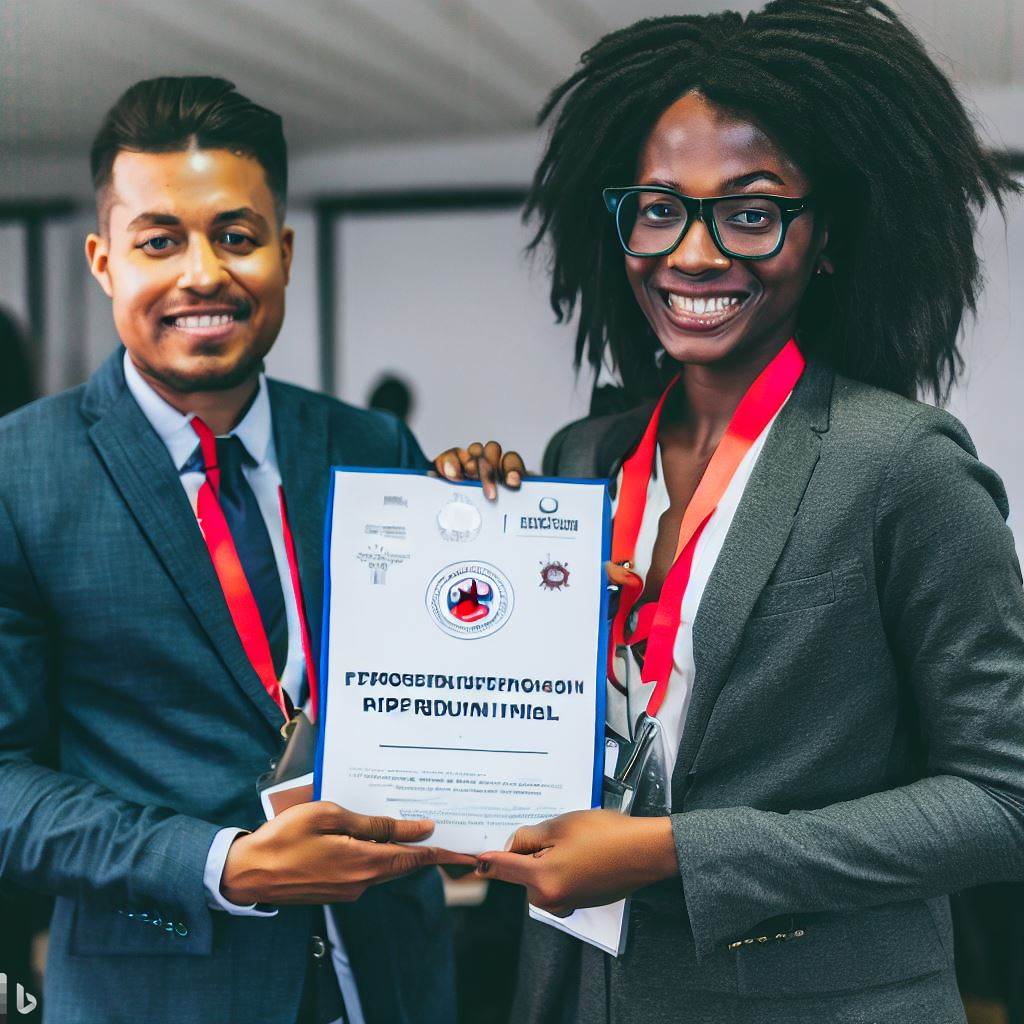Introduction
This section delves into the realm of Public Relations (PR), highlighting its significance both on a global scale and particularly in Nigeria.
The focal point of this discussion is the comparative analysis of PR practices within Nigeria and across the world.
This blog post initiates by providing a concise outline of PR, underlining its pivotal role in establishing and maintaining public connections.
Emphasizing the relevance of comprehending PR within Nigeria and its broader global context, this section sets the stage for the subsequent exploration.
The core objective here is to juxtapose PR methodologies practiced in Nigeria with those on the global stage, unveiling distinctions and commonalities.
Definition and overview of PR in Nigeria
An explanation of PR and its purpose in Nigeria
Public Relations (PR) in Nigeria can be defined as the strategic communication process utilized to build and maintain relationships between organizations and their targeted audiences.
Its main purpose is to manage the perception of an organization or individual, thereby influencing public opinion and maintaining a positive image.
PR in Nigeria plays a crucial role in enhancing an organization’s credibility, reputation, and influence in the eyes of its stakeholders.
By employing various communication tools and techniques, PR professionals in Nigeria aim to create a favorable public perception, ensuring the organization’s objectives and values align with the expectations of the Nigerian public.
Role of governments and NGOs in Nigerian PR
In Nigeria, both the government and non-governmental organizations (NGOs) actively engage in PR activities to serve their respective interests.
The government utilizes PR to communicate policies, programs, and initiatives to the public, shaping public opinion and garnering support for its actions.
NGOs, on the other hand, employ PR strategies to raise awareness about social issues, advocate for change, and mobilize public support.
These organizations often rely on PR to educate the public, drive fundraising efforts, and foster collaboration with other stakeholders.
Challenges faced by PR professionals in Nigeria
Despite the significance of PR in Nigeria, professionals in this field encounter several challenges. One major obstacle is the lack of public trust in organizations and government institutions.
Due to various historical and contemporary issues, the Nigerian public remains skeptical of information disseminated by these entities, making it challenging for PR professionals to build and maintain trust.
Another challenge stems from the diverse cultural and linguistic backgrounds within Nigeria.
With over 250 distinct ethnic groups and multiple languages spoken across the country, effectively communicating messages that resonate with different audiences can be demanding for PR professionals.
Additionally, the rapid advancement of technology and the rise of social media pose new challenges for PR professionals in Nigeria.
With the widespread use of social media platforms, information spreads quickly, making it challenging to manage and control the narrative surrounding an organization or individual.
Moreover, inadequate infrastructure, such as unreliable internet access and limited media outlets in rural areas, poses challenges for disseminating PR messages to the entire Nigerian population.
PR professionals must find innovative ways to reach and engage audiences in these remote locations.
Most importantly, PR in Nigeria serves the purpose of shaping public perception, enhancing credibility, and managing relationships between organizations and their audiences.
The government and NGOs play vital roles in implementing PR strategies to communicate with the public effectively.
However, challenges related to public trust, cultural diversity, technological advancements, and infrastructure pose obstacles for PR professionals in Nigeria.
Despite these challenges, PR in Nigeria remains a crucial aspect of effective communication and reputation management.
Definition and overview of global PR
Introduction to PR practices on a global scale
- Global PR refers to public relations activities conducted on an international level.
- It involves managing communication and building relationships with diverse audiences across different countries.
- In the global context, PR professionals work to enhance the reputation and image of organizations worldwide.
International organizations and their role in global PR
- International organizations play a crucial role in shaping global PR practices.
- They provide guidelines and standards for PR professionals to follow in their global communication strategies.
- Organizations like the International Public Relations Association (IPRA) and Public Relations Society of America (PRSA) promote best practices in global PR.
- These organizations also offer networking opportunities and platforms for knowledge exchange among PR practitioners worldwide.
Major differences between Nigerian PR and global PR
- Nigerian PR primarily focuses on local or national audiences, while global PR targets international audiences.
- Global PR requires a deep understanding of cultural nuances, languages, and local customs in various countries.
- In Nigeria, PR campaigns often revolve around government, political, and social issues.
- Meanwhile, global PR campaigns cater to the needs of multinational corporations and global brands.
- While Nigerian PR professionals still rely on traditional media, global PR extensively utilizes digital platforms and social media.
- Measurement and evaluation of PR activities are more advanced in the global PR landscape compared to Nigeria.
- In Nigeria, PR is sometimes seen as a tool for reputation management during crisis situations.
- Global PR, on the other hand, aims to proactively build and maintain a positive reputation for organizations worldwide.
Overall, global PR encompasses a broader scope and requires a more diversified skill set compared to Nigerian PR practices.
Understanding the unique challenges and opportunities of both these PR approaches is essential for PR professionals operating in Nigeria and globally.
Comparative analysis: Nigerian PR vs. global PR
In this section, we will conduct a comparative study between PR practices in Nigeria and those used globally.
We will examine the strategies and tactics employed by Nigerian PR professionals, compare them with global PR campaigns in terms of effectiveness and scope, and evaluate the impact of cultural differences on PR approaches.
Examination of PR strategies and tactics in Nigeria
Nigeria’s PR industry has witnessed significant growth in recent years.
The strategies and tactics employed by Nigerian PR professionals vary widely, depending on the nature of the campaign and the target audience.
Public relations in Nigeria often entails a strong emphasis on media relations and influencer engagement.
PR practitioners in Nigeria focus on building relationships with key journalists and media outlets to ensure their message reaches the right audience.
This approach relies heavily on personal connections and networking, which are crucial in Nigerian business culture.
Comparison with global PR campaigns in terms of effectiveness and scope
When comparing Nigerian PR campaigns with global ones, several factors come into play, including budget constraints, technological advancements, and cultural nuances.
Global PR campaigns often benefit from higher budgets and access to cutting-edge communication technologies.
This allows them to reach a wider audience and employ a more diverse range of tactics, such as social media campaigns, digital storytelling, and experiential events.
However, Nigerian PR campaigns, even with limited resources, have proven effective in engaging local audiences and driving desired outcomes.
Evaluation of Cultural differences impacting PR approaches
One critical aspect to consider when comparing Nigerian PR with global PR is the influence of cultural differences.
Nigeria, as a diverse country with multiple ethnic groups, languages, and traditions, requires PR campaigns tailored to different cultural contexts.
Nigerian PR professionals must navigate these differences to develop effective strategies that resonate with local audiences.
In contrast, global PR campaigns often aim for a more universal appeal, which can sometimes overlook or misinterpret cultural nuances.
Adapting PR approaches to specific cultural contexts is essential for successful communication and public relations in any given market.
In short, the comparative analysis of Nigerian PR with global PR campaigns highlights the unique characteristics and challenges faced by PR practitioners in Nigeria.
Despite the limitations in resources, Nigerian PR campaigns have shown effectiveness in engaging local audiences.
Understanding cultural differences and adapting PR approaches accordingly is crucial for successful communication in both local and global contexts.
By acknowledging these differences, PR professionals can develop strategies that resonate with diverse audiences and drive desired outcomes.
Read: PR Specialist: Key Players in Nigeria’s Growth Story

Case studies: PR success stories in Nigeria and globally
Studying successful PR campaigns in Nigeria
- In Nigeria, a successful PR campaign was conducted by Insight Public Relations to launch a new product.
- The campaign involved engaging key influencers, organizing press conferences, and utilizing social media channels.
- The PR team effectively communicated the unique features and benefits of the product to the target audience.
- As a result, the product gained significant media coverage, generated positive reviews, and achieved high sales.
- This case demonstrates the effectiveness of targeted PR strategies in Nigeria.
Highlighting examples of global PR campaigns that achieved their objectives
- In the global context, the PR campaign by Edelman stands out as a great success.
- The campaign aimed to create awareness about a social cause and raise funds for it.
- Through storytelling, impactful visuals, and collaborations with influential celebrities, the campaign gained tremendous traction.
- It surpassed the initial fundraising goal, created a global movement, and brought significant positive change.
- This global PR success story showcases the power of creativity and effective storytelling.
Extracting lessons from both Nigerian and global PR successes
- The success of PR campaigns in Nigeria highlights the importance of targeting key influencers and utilizing social media.
- Nigerian companies can learn from global campaigns the significance of impactful storytelling and collaborations.
- By combining the strengths of Nigerian and global PR approaches, companies can maximize their chances of success.
- Effective communication, creative strategies, and adaptability are key elements for PR success both locally and globally.
- Continuous learning and staying updated with PR trends contribute to achieving objectives in the dynamic PR landscape.
In fact, studying successful PR campaigns in Nigeria and globally provides valuable insights for companies aiming to achieve PR success.
Nigeria has witnessed successful campaigns by effectively targeting key influencers and utilizing social media channels, while global examples highlight the power of impactful storytelling and collaborations.
By extracting lessons from both Nigerian and global PR successes, companies can adopt a holistic approach that combines effective communication, creative strategies, and adaptability.
Continuous learning and staying updated with PR trends play a crucial role in achieving objectives both locally and globally.
Read: Day in the Life: A Nigerian PR Specialist
Challenges and Advancements in Nigerian PR
Discussion on the Inherent Challenges Faced by PR in Nigeria
- Limited government support and recognition hamper the growth of PR in Nigeria.
- Lack of adequate infrastructure and resources hinder effective PR campaigns in the country.
- Limited media freedom and censorship impose constraints on PR professionals in Nigeria.
- The prevalence of corruption poses ethical challenges for PR practitioners in the country.
- Limited understanding and appreciation of PR by clients and the public make it difficult to achieve desired outcomes.
Highlighting Advancements and Innovations in Nigerian PR Practices
- The emergence of digital and social media platforms has revolutionized PR practices in Nigeria.
- PR agencies now utilize data-driven strategies and analytics to make informed decisions.
- Mobile technology advancements have allowed for real-time communication and engagement with audiences.
- Collaborative partnerships between PR agencies and influencers have enhanced brand visibility and credibility.
- Innovative storytelling techniques, such as immersive experiences and interactive content, are gaining popularity.
Opportunities for Growth and Improvement in the Nigerian PR Industry
- Enhancing education and training programs to improve the skills and knowledge of PR professionals.
- Developing a robust regulatory framework to enhance professionalism and ethics in PR practices.
- Encouraging collaboration and knowledge sharing among PR practitioners through industry associations.
- Investing in research and development to stay updated with global PR trends and best practices.
- Educating clients and the public about the value and impact of PR to build trust and encourage support.
In essence, the Nigerian PR industry faces inherent challenges related to government support, infrastructure, media freedom, corruption, and limited understanding.
However, advancements in digital technology, data-driven strategies, and innovative storytelling provide opportunities for growth.
By focusing on education, regulation, collaboration, and client/public education, the Nigerian PR industry can overcome these challenges and thrive in the global landscape.
Read: Emerging Trends in the Make-up Artist Profession in Nigeria
Explore Further: Music Directors’ Contribution to Nigerian Cultural Heritage
Lessons learned and future prospects
Summary of key findings and insights from the comparative study
- The comparative study revealed that PR practices in Nigeria lag behind global standards.
- Nigerian PR professionals need to upgrade their skills and knowledge to compete globally.
- The study highlighted the importance of transparency and ethical practices in PR.
Potential for knowledge exchange between Nigerian and global PR professionals
- Nigerian PR professionals can benefit from collaborations and knowledge sharing with global counterparts.
- Exchange programs and conferences can facilitate the transfer of best practices and innovative ideas.
- Building networks with global PR professionals can help Nigerian practitioners stay updated with industry trends.
Recommendations for enhancing PR practices in Nigeria
- Establish a regulatory body to enforce ethical standards and ensure accountability in the PR industry.
- Develop comprehensive training programs to address the skill gaps identified in the comparative study.
- Emphasize the importance of research and data-driven strategies in PR campaigns.
- Encourage the adoption of digital tools and technologies to enhance PR effectiveness.
- Foster partnerships between PR agencies and educational institutions to promote continuous learning and development.
In the end, the comparative study on PR in Nigeria versus globally has highlighted the need for improvement in the Nigerian PR landscape.
The findings underscore the importance of transparency, ethical practices, and continuous professional development.
It is crucial for Nigerian PR professionals to upgrade their skills, embrace innovation, and foster knowledge exchange with their global counterparts.
By implementing the recommendations provided, Nigeria can enhance their PR practices and strive towards global standards.
Read: Women in PR: Breaking Barriers in Nigeria
Uncover the Details: Nigeria’s Literary Festivals: A Haven for Writers
Conclusion
Recap of key points discussed in the blog post:
- Nigeria’s PR practices compared to global standards.
- Challenges faced by PR professionals in Nigeria.
- Benefits of conducting a comparative study.
- Examples of successful PR campaigns globally.
- Necessary improvements for Nigerian PR practices.
Reinforcement of the importance of comparative study on PR in Nigeria and globally
By analyzing and benchmarking Nigeria’s PR efforts against global practices, significant insights and areas for improvement can be identified.
This allows Nigerian PR professionals to learn from global best practices and adapt them to suit the local environment.
Closing thoughts on the potential impact of improved Nigerian PR practices
With enhanced PR strategies, Nigeria can improve its image on the international stage, attract foreign investments, strengthen diplomatic relations, and promote its culture and values effectively.
Furthermore, improved PR practices can positively influence socio-political discourse and facilitate transparent communication between the government, organizations, and the public.
In summary, conducting a comparative study on PR in Nigeria and globally is essential for the growth and development of the Nigerian PR industry.
By embracing global best practices, Nigerian PR professionals can elevate their skills, enhance public perception, and contribute to the overall progress of the nation.




